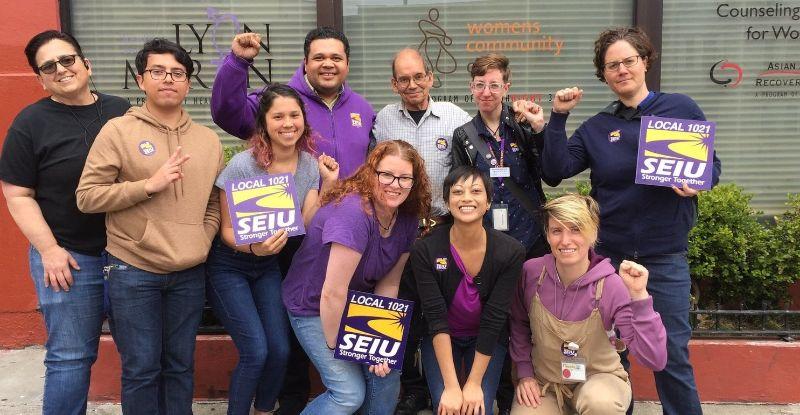
Nonprofit workers across SF speak up for fair wages and funding
On April 28, dozens of workers from HR360, Larkin Street Youth Services, Tenderloin Housing Clinic, Baker Places, and other nonprofits around San Francisco spoke out at a Budget Committee hearing. We called for increased nonprofit funding and the creation of a framework for pay parity between nonprofit workers and SEIU 1021 members in the public sector. Achieving parity in pay between private and public sector workers doing similar work would remove the City’s financial incentive to privatize more of this work.
Low pay and low morale within nonprofits doing business with the City are leading to high turnover. People frequently leave for higher-paying jobs elsewhere, and our communities lose skilled, dedicated, and knowledgeable workers who serve some of our most vulnerable residents and tackle some of our city’s most visible issues.
“Working at a nonprofit is beautiful and at the same time a challenge. We are underpaid and carry a full load of tasks and stress. This often leads coworkers to leave the companies to go to higher-paid jobs, including civil service jobs with the city. This high turnover has a real impact on the quality of care we provide to our clients. We often are forced to turn away Spanish-speaking clients due to lack of bilingual staff, which is especially heartbreaking,” Adriana Nunez, an Intake Coordinator at HR360, told members of the committee.
For members like Adriana, their work is also deeply personal. She went on to tell the committee, “I know firsthand how vital these programs are for people. I grew up seeing my siblings struggle with addiction and finding them help. Like many of us, I work in this field because I want to give back, but we need your help. That’s why I’m here today asking the City of San Francisco to fully fund the Cost of Doing Business (CODB) and Minimum Compensation Ordinance (MCO) to help us attract and retain talented, dedicated staff to care for some of our city’s most vulnerable populations.”
By not fully funding the Cost of Doing Business allocation or addressing wage compaction and pay equity within nonprofits, the City inadvertently contributes to these problems. Together, we’re hopeful we can work towards solutions.

